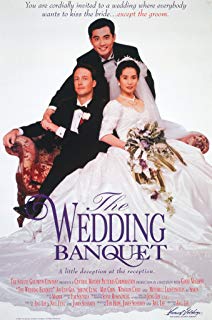電影訊息
電影評論更多影評

2011-04-24 21:26:25
One Bridegroom, Two Brides
When Brokeback Mountain came into theatre, people were amazed at the sentimental capture of issue of homosexual romance by Ang Lee. It got 8 nominations and finally won 3 of them, including the Best Achievement in Directing on the 78th Academy Award ceremony. The scene of Jack and Ennis jumping into the pond from the cliff is seen as the big liberation of their forbidden love and will last on the history of film forever. However, Brokeback Mountain is not Ang Lee’s first work that touches the sensitive area of forbidden love of two men. As early as 1994, He made the film Wedding Banquet in Taiwan, winning international applause for his awareness and artistic display of the issue. On the poster of the film, the bridegroom stands behind two people, a man and a woman. The triangle suggests an abnormal relationship among the three people—actually in the film, one is the man’s real lover, and the other is his fake bride.
Wedding Banquet tells a story of a Chinese man, Weitong, who has been living in 紐約 for nearly ten years. His parents are worried about his marriage so they arrange him a date with a beautiful and well-educated Chinese woman. However perfect the woman is, Weitong has not any feelings because he is only appealed to people of his same gender. He is living together with his boyfriend Simon in an apartment in the city. Worried about the crazy reaction of his conventional parents, Weitong has not mentioned anything about this 「forbidden relationship」. In the meantime, the pressure from his parents causes Weitong has no choice but to have a fake wedding with a Chinese girl, Weiwei. When Weiwei wants to earn a green card in order to live in 紐約 legally, they make the deal.
Weitong’s parents come all the way from Taiwan to attend the wedding banquet, which is held in a gorgeous Chinese restaurant in 紐約. The ceremony brings the climax of the whole film. The banquet is described into a crazy, chaotic and controversial ceremony, full of traditional Chinese elements, and is a summation of all the things Ang Lee wants to express. Different from the stereotypical Asian images of politeness and tranquility, the Chinese guests turn into 「crazy animals」 in the banquet, forcing the couples to drink a lot of alcohol and indulging in getting the couples to play sexual games in the hotel room. Humorously, the director himself acts as one of the guests in the wedding, and says an important line, 「this is the result of the 5000 years of sex suppression in China」.
The story continues in an ironical way. Although a homosexual man, Weitong has an affair with Weiwei and Weiwei accidentally gets pregnant at the wedding night. Weitong decides to tell the truth to his mother, while still trying to hide it from his father. However no one knows until the end that Weitong’s father has known the uncommon sexual orientation of his son for a long time and he has been hiding it to avoid direct conflicts.
In Wedding Banquet, Ang Lee uses exactly the same group of people as he does in Eat Drink Man Woman and continues the identical personality of the roles. Both of the father roles are acted by Xiong Lang. The two fathers are traditional and stubborn, while in the meantime struggles with their old ideology to offer the best acceptance they can to their children. Wenxuan Zhao, while being molded as a successful manager with experience of abroad education in Eat Drink Man Woman, is an Asian who moves to live and work abroad. These two roles are both influenced by both Chinese and western culture. Actually, Wedding Banquet, Eat Drink Man Woman and another film, Pushing Hands, are Ang Lee’s trilogy of father and all focuses on the conflicts between a Chinese father and a westernized Chinese son. The making of the trilogy originates from Ang Lee’s personal experience. Born in Taiwan and having western education, Lee is a typical amalgam of eastern and western culture. And as Lee once mentioned, he has a traditional father who sticks to the conventions and has a gap for understanding Lee’s career as a director who makes movies in America. Therefore many scenes in the films are Lee’s real experience, which make the films convincing and real. Interestingly, it was these three consecutive successes that enabled Ang Lee to be noticed by the mainstream film industry in U.S. After that, Ang Lee began to stretch his talent in a broader area.
March 15, 2008
評論

